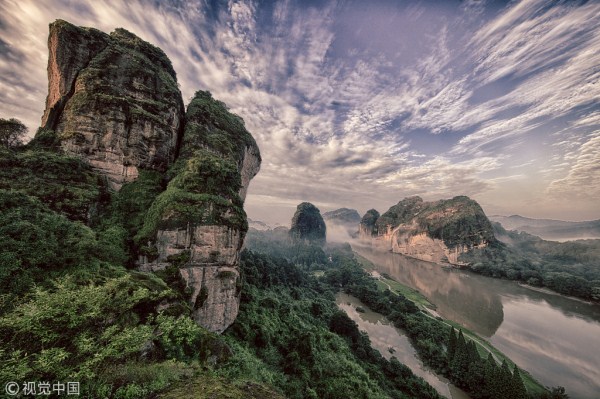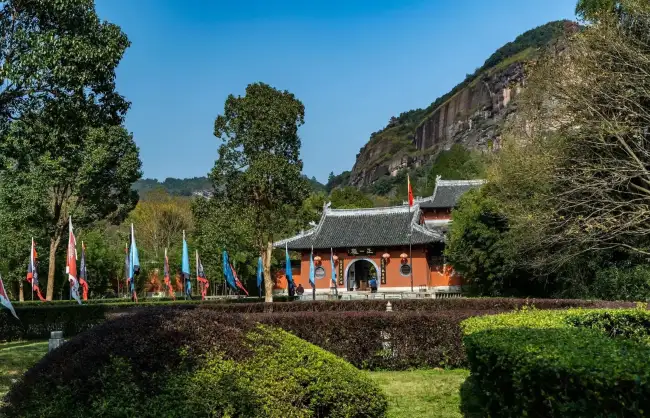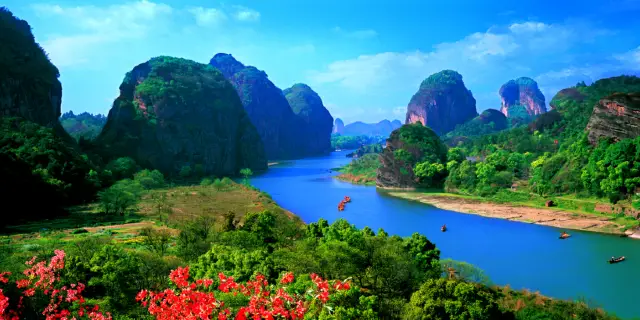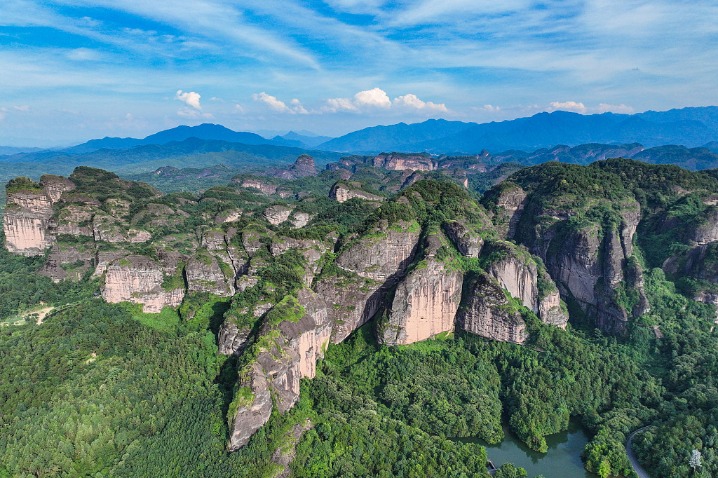Top 5 Incredible Hiking Trails in Daxin Longhu Mountain

An Essential Guide to Visiting Daxin Longhu Mountain
Nestled in the heart of Jiangxi province, Daxin Longhu Mountain (大新龙虎山) is a captivating destination that offers an enchanting blend of natural beauty and rich cultural heritage. This UNESCO World Heritage site is not only a haven for nature lovers but also a sacred ground steeped in the traditions of Taoism. Revered as the birthplace of this ancient philosophy, Longhu Mountain boasts a landscape dotted with historic temples, monasteries, and palaces that once served as spiritual sanctuaries for Taoist practitioners.
As you traverse the picturesque trails, you’ll be greeted by breathtaking views of rugged cliffs and lush greenery, with the serene Luxi River winding gracefully through the valley. The air is filled with a sense of tranquility, inviting you to immerse yourself in the profound spirituality that permeates the area. From the fascinating cliff tombs of the Ming dynasty to the awe-inspiring performances that showcase local traditions, every corner of Longhu Mountain tells a story waiting to be discovered.
Whether you’re a spiritual seeker, a history enthusiast, or simply in search of a peaceful retreat, Daxin Longhu Mountain offers a unique experience that transcends mere sightseeing. Prepare to embark on a journey that not only enriches your understanding of Taoism but also rejuvenates your spirit amidst one of China’s most breathtaking landscapes.
In This Guide
- An Essential Guide to Visiting Daxin Longhu Mountain
- The Rich History and Legends of Daxin Longhu Mountain
- Main Highlights: What You Absolutely Can’t Miss
- Planning Your Visit: A Practical Guide
- Tickets: Prices, Booking, and Tips
- How to Get There: A Complete Transportation Guide
- Local Cuisine and Accommodation Nearby
- Frequently Asked Questions
- Final Thoughts on Your Trip
The Rich History and Legends of Daxin Longhu Mountain
Nestled in the verdant landscapes of Jiangxi Province, Daxin Longhu Mountain, known as the Dragon and Tiger Mountain, is a striking blend of natural beauty and rich cultural heritage. This iconic site is steeped in history, particularly as a significant center for Taoism, one of China’s oldest philosophical and religious traditions.
Longhu Mountain’s historical significance can be traced back to the East Han Dynasty (25-220 AD), when it became a sanctuary for Taoist practitioners. The area flourished, giving rise to ten Taoist palaces, 81 temples, 50 monasteries, and 10 academies dedicated to the teachings of Taoism. Among these, the Shangqing Palace stands out, revered as the birthplace of Taoist alchemy and immortality practices, where the legendary Master Zhang Tianshi is said to have created elixirs of life.
The mountain is not only a spiritual haven but also a captivating geological marvel. Its dramatic landscape features towering cliffs, deep ravines, and unique rock formations that have been shaped over millennia. One of the most intriguing aspects of Longhu Mountain is its cliff tombs, where coffins were interred in natural caves and man-made ledges. This ancient burial practice, dating back to the Ming Dynasty, reflects the local belief that the deceased would be closer to the heavens, a notion deeply intertwined with Taoist philosophy.
Longhu Mountain’s allure extends beyond its historical sites. The area is home to numerous legends and folklore, many of which center around the mythical dragons and tigers that give the mountain its name. These creatures symbolize power and protection in Chinese culture, further enriching the mystique of the landscape. Visitors often find themselves enchanted by tales of ancient deities and celestial beings associated with the mountain, enhancing their journey through this serene environment.
Today, Daxin Longhu Mountain is recognized as a UNESCO World Heritage Site, attracting travelers not just for its breathtaking vistas but also for its deep spiritual roots. Each step through this majestic region allows visitors to immerse themselves in the harmonious blend of nature and culture, making it a must-visit destination for anyone seeking a deeper understanding of China’s rich history and traditions.
Whether you are a spiritual seeker, a history enthusiast, or simply looking for tranquility, Daxin Longhu Mountain offers an unforgettable experience that resonates with the essence of Taoism and the timeless beauty of its landscape.

Daxin Longhu Mountain.
Main Highlights: What You Absolutely Can’t Miss
Daxin Longhu Mountain is a captivating destination where natural beauty and rich cultural heritage intertwine. As a UNESCO World Heritage site, this sacred mountain is celebrated not only for its stunning landscapes but also for its deep-rooted Taoist traditions. Here’s a guide to the main highlights you absolutely cannot miss during your visit to this enchanting locale.
Scenic Landscapes
Stunning Rock Formations
The breathtaking rock formations of Daxin Longhu Mountain are a sight to behold. The reddish sandstone cliffs and unique geological structures, including natural caves and tubular pockets, create a mesmerizing backdrop that draws photographers and nature lovers alike. Don’t forget your camera to capture the awe-inspiring vistas!
Luxi River Rafting
Experience the tranquility of the Luxi River as you embark on a bamboo raft journey. This leisurely ride allows you to soak in the serene surroundings, with lush greenery and dramatic cliffs lining the riverbanks. The gentle currents make for a peaceful escape and a perfect way to appreciate the mountain’s natural beauty.
Cultural Heritage
Taoist Temples and Monasteries
Daxin Longhu Mountain is often regarded as the birthplace of Taoism, boasting a rich array of temples and monasteries. With over 81 temples and 50 monasteries, including the famous Shangqing Palace, visitors can immerse themselves in the spiritual atmosphere that permeates this sacred site. The intricate architecture and tranquil settings provide a glimpse into the historical significance of Taoism in the region.
Hanging Coffins
One of the most intriguing aspects of Daxin Longhu Mountain is the ancient practice of cliff burial, where coffins were placed in natural caves or man-made niches high in the cliffs. These hanging coffins, dating back to the Ming Dynasty, offer a fascinating insight into the local customs and beliefs regarding death and the afterlife. Take time to learn about the significance of these sites and the stories behind them.
Unique Experiences
Cultural Performances
Don’t miss the chance to witness traditional performances, such as the hanging coffin reenactments and local river dances. These performances provide a vibrant glimpse into the region’s cultural heritage and are often accompanied by lively music and colorful costumes.
Taoist Academies and Practices
For those interested in deepening their understanding of Taoist philosophy, consider participating in Tai Chi or Feng Shui workshops offered in the area. These experiences not only enhance your visit but also allow for a personal connection to the teachings of Taoism that have flourished in Longhu Mountain for centuries.
Adventure Awaits
Hiking Trails
With over 220 square kilometers of scenic terrain, Daxin Longhu Mountain offers numerous hiking trails suitable for all levels of adventurers. Whether you’re looking for a leisurely stroll or a challenging trek, the trails will lead you through lush forests, rocky outcrops, and panoramic viewpoints that showcase the mountain’s natural grandeur.
Conclusion
A visit to Daxin Longhu Mountain is more than just a trip to a beautiful landscape; it’s an opportunity to connect with the profound spirituality and rich cultural history of Taoism. From stunning natural sights to unique cultural experiences, this destination promises to leave an indelible mark on every traveler’s heart. Don’t miss the chance to explore this sacred mountain and uncover its many secrets!

Daxin Longhu Mountain.
Planning Your Visit: A Practical Guide
Daxin Longhu Mountain, or Longhu Shan, is a mesmerizing destination nestled in Jiangxi Province, revered for its stunning natural landscapes and rich Taoist heritage. For international travelers planning a visit, here’s a practical guide to help you make the most of your experience.
Getting There
By Train: The nearest major city is Yingtan, which is well-connected by high-speed trains from larger cities like Shanghai and Beijing. From Yingtan Railway Station, you can take a local bus or taxi to Daxin Longhu Mountain, which is approximately 30 kilometers away.
By Air: The closest airport is the Yingtan Mingyue Mountain Airport. From there, you can hire a taxi or take a shuttle bus to reach Longhu Mountain.
Best Time to Visit
The ideal time to visit Daxin Longhu Mountain is during the spring (March to May) and autumn (September to November) months when the weather is mild, and the natural scenery is at its most vibrant. During these seasons, you can enjoy pleasant temperatures and avoid the summer crowds.
Entrance Fees and Tickets
Entrance to Longhu Mountain typically requires a ticket, which can range from approximately 260 yuan (around $40) for a combo ticket that includes access to various attractions within the scenic area. Consider purchasing tickets in advance online or at the station to avoid long queues. Remember to bring your ID, as it may be required during the ticket purchase.
Getting Around
Once inside the scenic area, you have several options for getting around:
-
Shuttle Bus/Tram: The park offers a convenient jump-on, jump-off tram service that connects major attractions within the park. This is especially helpful if you prefer not to walk long distances.
-
Bamboo Rafting: Experience the tranquility of the Luxi River by taking a bamboo raft ride. This scenic journey allows you to appreciate the stunning cliffs and natural beauty from a unique perspective.
-
Walking Trails: For the adventurous, several walking trails meander through the park, leading you to hidden gems and breathtaking viewpoints. Wear comfortable shoes and be prepared for some elevation changes.
What to See and Do
Taoist Heritage: Daxin Longhu Mountain is known as the birthplace of Taoism, featuring numerous historical sites including ten Taoist palaces, 81 temples, and 50 monasteries. Be sure to visit key sites like Shangqing Palace, where you can learn about the history and philosophy of Taoism.
Hanging Coffins: One of the most intriguing attractions is the hanging coffins, where coffins are placed in cliffside caves. Guided tours often include demonstrations on how these coffins were historically placed in their high-altitude resting spots.
Natural Landscapes: The area is rich in geological wonders, including reddish sandstone formations and picturesque cliffs. Take time to explore the scenic vistas and enjoy the tranquility of nature.
Tips for Your Visit
-
Language: While some staff may speak basic English, having a translation app handy can enhance your experience, especially when interacting with local vendors or guides.
-
Cash: While some places accept cards, it’s advisable to carry cash, as many local shops and vendors only accept Renminbi (RMB).
-
Respect Local Customs: As a site of spiritual significance, be respectful when visiting temples and other sacred areas. Dress modestly and maintain a respectful demeanor.
-
Local Cuisine: Don’t miss the opportunity to savor local Jiangxi cuisine. Look for small restaurants or street vendors selling traditional dishes that will give you a taste of the region.
Accommodations
For those wishing to stay overnight, consider booking accommodations in Yingtan, where you’ll find a range of options from budget inns to more upscale hotels. Staying close to the entrance of Longhu Mountain can also provide easy access for early morning visits.
Conclusion
Daxin Longhu Mountain offers a unique blend of natural beauty, rich history, and spiritual depth, making it a must-visit destination for international travelers. With this guide in hand, you’re ready to explore this enchanting area and immerse yourself in its wonders. Enjoy your adventure!

Daxin Longhu Mountain.
Tickets: Prices, Booking, and Tips
Visiting Daxin Longhu Mountain (大新龙虎山) promises an unforgettable experience, blending natural beauty with rich cultural heritage. To ensure a smooth journey, it’s vital to navigate the ticketing process effectively.
Ticket Prices
Entry to Daxin Longhu Mountain is quite reasonable, with ticket prices typically around 260 yuan (approximately $40 USD) for a standard adult admission. This ticket grants access to various highlights within the scenic area, including the famous Hanging Coffin performances and the picturesque Luxi River. Keep in mind that there are options for combo tickets that may include additional experiences, such as guided tours or river raft rides, which can enhance your visit.
Booking Tickets
Tickets can be purchased at the entrance of the scenic area, but for a hassle-free experience, consider booking in advance. Many travelers recommend buying tickets online through reputable travel sites or local tourism platforms. This can save time and ensure you secure a spot, especially during peak tourist seasons. Presenting your ID at the time of purchase may allow for a return visit the next day, giving you ample time to explore the expansive 220 square kilometers of the geological park.
Tips for a Great Experience
-
Plan Your Visit: To fully appreciate the cultural and natural sights, allocate at least a full day for your visit. If possible, consider staying overnight in nearby accommodations to explore more leisurely.
-
Use Transport Options: The area offers convenient transport options, such as shuttle buses and trams that provide easy access to the main attractions. These are particularly helpful if you prefer not to walk long distances.
-
Check for Discounts: Some attractions may offer discounted rates for students, seniors, or group bookings. Always inquire about potential savings when purchasing your ticket.
-
Language Considerations: While many signage and guides are available in English, having a basic understanding of Chinese phrases can enrich your experience, especially in more remote areas where English speakers may be limited.
-
Stay Flexible: Weather conditions can change rapidly in mountainous regions. Be prepared for varying temperatures and pack accordingly.
By following these guidelines, you can ensure a rewarding and enriching experience at Daxin Longhu Mountain, immersing yourself in its stunning landscapes and profound cultural significance. Happy travels!
How to Get There: A Complete Transportation Guide
Traveling to Daxin Longhu Mountain can be an exhilarating adventure, blending natural beauty with rich cultural heritage. To ensure a seamless journey to this iconic destination in Jiangxi Province, here’s a comprehensive guide on how to get there.
By Air
The nearest major airport to Daxin Longhu Mountain is Nanchang Changbei International Airport (KHN), located approximately 200 kilometers away. From various international locations, you can find flights connecting to Nanchang. Once you land, you have a few options to reach Longhu Mountain:
- Train: Head to Nanchang Railway Station and take a high-speed train to Yingtan, which takes about 1.5 hours. From Yingtan, you can take a bus or taxi to the mountain.
- Bus: There are direct buses from the airport to Yingtan. Check the airport’s transportation desk for the latest schedules.
By Train
For those already in China, traveling by train is one of the most efficient ways to reach Daxin Longhu Mountain. Yingtan Railway Station serves as the main gateway:
- High-Speed Train: If you are coming from major cities like Shanghai or Guangzhou, the high-speed train is your best bet. The journey from Shanghai takes about 4 hours, while from Guangzhou it can be around 3.5 hours.
- Local Transport: Upon arrival at Yingtan Railway Station, you can take bus K2 to the town center, which costs around 3 yuan. From there, a short taxi ride will take you to the entrance of Longhu Mountain.
By Bus
If you prefer road travel, several long-distance buses operate from nearby cities to Yingtan:
- From Nanchang: Direct buses run frequently from Nanchang’s main bus station to Yingtan, taking approximately 2.5 to 3 hours.
- Local Buses: Once in Yingtan, local buses or taxis will easily take you to the mountain entrance.
Getting Around Longhu Mountain
Once you arrive at Longhu Mountain, the area is expansive, and walking the entire park can be challenging. Here are your transportation options within the scenic area:
- Shuttle Buses: The park provides a convenient jump-on, jump-off shuttle bus service to various attractions within the area.
- Bamboo Rafting: For a unique experience, consider taking a bamboo raft ride along the Luxi River, offering stunning views of the surrounding cliffs and temples.
- Walking: While some attractions are accessible by shuttle, exploring on foot allows you to truly immerse yourself in the natural beauty and cultural elements of this sacred site.
Tips for International Travelers
- Language Barrier: English is not widely spoken in the region, so a translation app or basic Mandarin phrases can enhance your experience.
- Currency: Ensure you have Chinese Yuan (CNY) for local transactions, as credit cards may not be accepted everywhere.
- Transport Apps: Consider downloading local transport apps for bus schedules and taxi services to make navigation easier.
With this detailed transportation guide, you’re all set for an unforgettable journey to Daxin Longhu Mountain. Whether you’re seeking spiritual enlightenment, natural beauty, or cultural experiences, this destination promises to deliver it all. Safe travels!

Daxin Longhu Mountain.
Local Cuisine and Accommodation Nearby
Nestled in the heart of Jiangxi province, Daxin Longhu Mountain offers not only breathtaking natural beauty but also a delightful culinary experience and comfortable accommodations that will make your visit unforgettable.
Culinary Delights
When it comes to local cuisine, the region around Longhu Mountain is a treasure trove for food lovers. Here are some must-try dishes and nearby eateries:
-
Longhu Mountain Tofu: Known for its delicate texture and rich flavor, this dish is a staple in the area. Look for restaurants that serve it in various styles, whether stir-fried, steamed, or in a hot pot.
-
Jiangxi Rice Noodles (米粉): These thin, chewy noodles are often served in a fragrant broth with fresh vegetables and meat. A local favorite is the spicy version, which packs a flavorful punch.
-
Braised Fish: The rivers surrounding Longhu Mountain are home to various freshwater fish. Many restaurants offer fish dishes that are expertly braised or steamed with local herbs and spices.
-
Wild Mushroom Dishes: The mountainous terrain is abundant with wild mushrooms. Seek out dishes featuring these local fungi, which are often sautéed with garlic and served as a side or incorporated into main dishes.
A few popular dining spots include:
-
Longhu Mountain Restaurant: Located near the entrance of the scenic area, this eatery offers a range of local dishes and is well-regarded for its tofu specialties.
-
Yingtan Pinpinmei Inn: While primarily an inn, this spot serves delightful home-cooked meals that showcase the best of Jiangxi cuisine, with an emphasis on fresh, local ingredients.
-
Local Street Food Stalls: Don’t miss the vibrant street food scene. Vendors often sell delicious snacks like grilled skewers, steamed buns, and sweet rice cakes, perfect for a quick bite between explorations.
Comfortable Stays
For accommodations, the area around Longhu Mountain provides a variety of options to suit different preferences and budgets.
-
Yingtan Pinpinmei Inn: This charming inn is a favorite among travelers for its cozy atmosphere and proximity to the mountain. With comfortable rooms and friendly service, it’s a great base for your adventures. Rates are budget-friendly, typically around 75 yuan per night.
-
Longhu Mountain Scenic Area Hotel: Situated right in the heart of the scenic area, this hotel offers modern amenities with stunning views of the surrounding landscape. It’s perfect for those looking to immerse themselves in nature, with direct access to hiking trails and attractions.
-
Local Guesthouses: For a more authentic experience, consider staying in one of the local guesthouses. These often feature traditional architecture and provide a warm, welcoming atmosphere, along with home-cooked meals.
Whether you’re savoring local dishes or resting in comfortable accommodations, your visit to Daxin Longhu Mountain promises to be a delightful blend of culture, cuisine, and natural beauty.

Daxin Longhu Mountain.
Frequently Asked Questions
Frequently Asked Questions about Daxin Longhu Mountain
-
What is Daxin Longhu Mountain known for?
Daxin Longhu Mountain, or Mount Longhu, is renowned for its rich Taoist heritage, stunning natural landscapes, and historical significance. It features numerous Taoist temples, monasteries, and palaces, making it a spiritual haven for visitors interested in Taoism and Chinese culture. -
How do I get to Daxin Longhu Mountain?
The mountain is accessible via public transport from major cities like Yingtan, which is well-connected by train. Once in Yingtan, local buses and taxis can take you to the entrance of the scenic area. Many visitors also choose to stay in nearby accommodations for an extended exploration. -
What are the main attractions within the mountain area?
Key attractions include the cliff tombs, the impressive rock formations, and the various Taoist temples scattered throughout the area. The scenic boat rides on the Luxi River and performances showcasing local cultural traditions, like the hanging coffins, are also popular highlights. -
Are there any guided tours available?
Yes, there are several guided tours offered that cater to different interests and durations. These tours often include cultural performances, guided hikes, and opportunities to learn about Taoist philosophy, making them a great way to experience the mountain. -
What is the best time of year to visit Daxin Longhu Mountain?
The best times to visit are during spring (March to May) and autumn (September to November) when the weather is mild and the scenery is particularly beautiful. Summer can be hot and humid, while winter may bring colder temperatures. -
Is there an entrance fee to visit the scenic area?
Yes, there is an entrance fee to access the main scenic area of Daxin Longhu Mountain. Ticket prices may vary based on the type of experience you choose, such as guided tours or additional activities like boat rides. -
What should I wear and bring for my visit?
Comfortable footwear is essential for exploring the extensive walking paths and hiking trails. Depending on the season, dress in layers to accommodate varying temperatures. Don’t forget to bring water, sunscreen, and a camera to capture the stunning views! -
Can I find English-speaking guides or staff at Daxin Longhu Mountain?
While some English-speaking guides are available, it’s advisable to check in advance or book a tour that specifically includes English-speaking services. The majority of the local signage and information may be in Chinese, so having a guide can enhance your experience.
Final Thoughts on Your Trip
As your journey through the enchanting landscapes of Daxin Longhu Mountain comes to a close, take a moment to reflect on the rich tapestry of experiences that await at this sacred site. From the serene beauty of the towering cliffs and lush forests to the profound sense of tranquility that envelops the area, Longhu Mountain offers a unique escape from the hustle and bustle of modern life.
Each step you’ve taken has woven you deeper into the rich cultural heritage of Taoism, connecting you with centuries of traditions and philosophies. The ancient temples, breathtaking river views, and the fascinating stories of the cliff tombs create a narrative that transcends time, inviting you to explore not just the physical landscape, but the spiritual essence of this remarkable place.
Whether you were entranced by the local performances, captivated by the stunning geology, or simply savoring the peaceful ambiance, Longhu Mountain has surely left an indelible mark on your heart. As you prepare to leave, carry with you the serenity and wisdom of this sacred mountain, and perhaps, let it inspire your own journey of discovery as you continue to explore the wonders of the world. Safe travels, and may your adventures ahead be just as enriching!